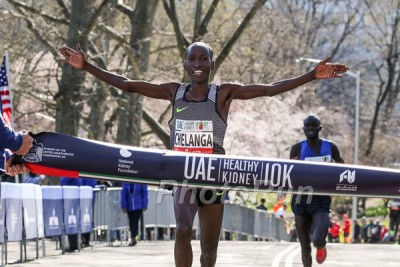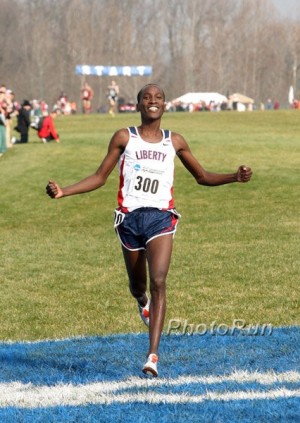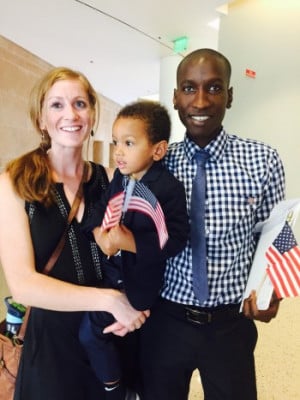Q&A Sam Chelanga on Life in the Army, His Running Comeback, & His New Book, “With the Wind”
By Jonathan Gault
July 21, 2020
You couldn’t have predicted the life of Sam Chelanga if you tried. Growing up in the village of Kabarsel in Baringo County, Chelanga didn’t like running but wound up as an errand boy for five-time world cross country champion Paul Tergat, a training partner of Chelanga’s brother Joshua. The great Tergat eventually convinced Chelanga his best hope of a good education was to take up the sport to try to earn a college scholarship in the United States. You may know how that story ended: Chelanga put together one of the most decorated careers in collegiate history, winning two NCAA cross country titles and setting an NCAA 10,000m record of 27:08.39.
After earning his US citizenship in 2015, Chelanga immediately became one of the country’s top runners. Yet in 2018, just weeks after finishing as the top American at the World Half Marathon Championships and winning the US 25k Championships, Chelanga walked away from the sport to enlist in the US Army.
For Chelanga, running has always been about so much more than his results, and life has always been about so much more than running. That’s a message he shares in his new book, With the Wind, which is being released this month and includes lessons Chelanga has learned in his unlikely journey.
LetsRun.com’s Jonathan Gault spoke to Chelanga on the phone on Thursday to discuss the book, life in the Army, and the status of Chelanga’s running comeback.
You surprised a lot of people when you retired in 2018 to enlist in the Army. What have you been up to since then?
It’s been a different lifestyle. What I can say is obviously I got to do that part that I’ve always wanted, the service part. It’s a different world. I learned a lot.
In sports, we do entertainment. The Army, they do the opposite of that. It’s just a different world. That really helped me personally, to grow. I was surprised. I thought when you go to the Army, you go in to serve. But also in that process, you improve a lot, it teaches you a lot of things.
What’s the biggest thing you’ve learned in your time in the Army?
Just the appreciation and the meaning of what it is like. For example, when you’re an elite [runner], some things sometimes will come almost like it’s obvious. You might think, you know, you go to a nice hotel, you do an awesome race. It’s just another race. But the Army, everything you do, it’s geared toward that service part.
The biggest thing that I learned is to put yourself out there. It’s not about you. I’m not going to lie to you — when you’re a star athlete, sometimes you feel good about yourself. You feel a little conceited. The Army, it humbles you. You learn to serve other people. You put other people before yourself. My job, that’s what I have to do every day.
When you retired in 2018, you were running very well that season, and I think that caught a lot of people by surprise. What was the reaction like from friends, family, competitors, when they found out you were retiring?
Some people didn’t understand, like why would you do that? But for me, it really was just simple. I had started the process [in April], but I wasn’t sold [on retiring] until after the London Marathon (where Chelanga finished 15th in 2:21). That’s when I knew, this is it.
Especially [one of] my last race[s], when I ran the [USATF] 25k Championships, I knew that I’m really good at running, [but] what I wanted to go do, I wanted to go and have energy and the motivation to do it. I just really felt motivated [to serve], and a lot of people might not have understood that.
In my heart, in terms of running, I felt like I had seen more than I came to see. But in the other world, the service world, I had never really done as much. It might have been tough for other people to see, but in my point of view, it was the easiest decision compared to other choices.
Where are you stationed now and what’s your assignment?
I just moved from Fort Jackson, South Carolina, and I’m now in Destin, Florida. I’m stationed in Eglin Air Force Base, we have a Special Forces group there for the Army, they work under the Air Force Base.
And what’s your position or title in the Army?
I’m about to become a first lieutenant. My current job is I work for a service platoon. I’m logistics, and my platoon is made up from anywhere from 20 to 30 people and we support the missions for the Special Forces guys.
You got back to running a bit this year — you ran 61:52 at the Houston Half Marathon and then you finished 21st at the Olympic Marathon Trials. How did that comeback come about?
That was a really fun experience. I know that I’m still capable of running. That’s why, when I got the opportunity to do it, I wanted to do it, but I just did it for fun. Quite honestly, even me finishing 21st in the Olympic Trials, that was not my potential. [If] I trained really well, I think I could have done better. When I ran 61:52, I was just coming off being rusty. I was working and just training part-time. And then I went to Arizona [before the Trials], I did long runs.
But it was just fun and just good to know if I want to do [it], I have a little bit of something left in me. I’d do it again if I had the chance.
Are you still training now?
I train just to maintain my fitness right now, with COVID-19. Because initially I was going to go for the 10k on the track, see how I could do. But with the Olympics gone and no races, I thought, I’ll focus on my job. But my goal is to keep staying fit because I don’t know if another opportunity is going to present itself. If it does with my current unit, I’ll probably train, just more intense. But I intend on running every day before work.
Is it tough to balance the two? How early do you have to get up to run?
It’s actually doable. It’s similar to college. You know like when you do running in the NCAA and then you do your classwork? It’s similar. The only difference is I have a job that sometimes isn’t going to be from nine to five. It can sometimes be at night, somewhere in the field. That’s the only difference.
But otherwise, on a normal schedule where we don’t have to go far from our base, it’s doable. But you just have to get up at 5:00 in the morning, you run. My previous job was really hard because you had to be at work at 5:00, but this one, some days I have to be at work at 9:00. It’s just like any other person that’s doing running and working. I think you can do it, but it’s not as easy as just doing running alone.
James McKirdy was coaching you ahead of the Trials. Is he still coaching you now?
[When] COVID-19 [hit], I just told him I’m going to go to work. He knew that I wasn’t going to be doing a lot of serious workouts for a while. So we kind of just took a break, but we still keep in touch. And when I want to get back to it again, when I need workouts, he’ll coach me again.
And it’s easy because he’s got that app called VDOT and it’s a very good app because you can always just look up your workouts and you can also upload it, Coach can see it. That’s why I like working with him — it’s good for remote training.
You have your book, With the Wind, coming out on Tuesday. What inspired you to write it?
I started writing a few snippets here and there as early as 2013. It was just the fact that you meet a lot of people, you hear a lot of stories and you read about how to do things from people like, say, Steve Jobs, how these real estate moguls did this, you can do this. But really what I never saw was just somebody telling their story of what happened in their lifetime so people can actually see it, they can relate to it. Just give us a raw take on different people.
And I realized that for me, I just couldn’t explain to myself how I was the way I was. I lived a life that I could have never predicted. So I thought it could be really cool to leave something behind for the other generation or anybody else to learn something from someone else and say, man, if he did this, I think I can also do it. Or at least to give people the hope. Because there are times where you just feel like you’re never going to amount to what you want to do or some of your goals are just too scary or too unrealistic. But my whole life is unrealistic, in my opinion. So that’s why I wrote the book.
Another reason why I wrote the book was, I thought coming from the village and then living a totally different life in America, that the lifestyle in the village and Africa, where I grew up in Kenya, may be so different from the lifestyle of somebody born in a place like the United States. And then I realized, actually, we’re the same. We really are the same. Our difference is just subjective to the environment that we grew up [in], but it’s the same problem, the same things that we go through.
I’ve heard people here say “Oh, that’s just a first-world problem” or “That’s a third-world problem.” No. A problem is a problem. It doesn’t matter where it is, it’s gonna hurt either way. Because pain, it’s the same pain. If I hurt my foot from hitting a rock, it’s the same pain as if something were to cut me. I can’t multiply it. It’s going to be the same.
What do you think are the book’s biggest lessons?
I think the biggest lesson of the book is in the title, going with the wind. The fact that one person realizes that, hey, I cannot control the past and I can’t control the future, but this is where I am right now and it’s awesome. What I need is going to be provided to me, I don’t have to search so hard, and after confirmation that you’re already full and [have] enough and you don’t really need to worry about it. The wind that you need to float you or sail you the way you’re going is already in the air. Just wait a little bit and it will fill up your sail and off you go.
What was the longest thing you had written before this?
When I was in college, I wanted to do law and I did some classes on pre-law and had done some legal research and writing and probably wrote an essay of 40-60 pages and it felt like it was forever.
So how challenging was this for you to write?
It’s just hard, like emotionally. I’m not the best typist, I really am not. For me, it was just coming to the realization that you are gonna share part of your journey with everybody and it’s always going to be there. And just telling yourself, are you sure you want to write about this? And the fact that somebody might not like it — am I willing to take that risk? What if I write this book and nobody even likes it? That was one of my biggest fears. What if I finish writing the book and somebody reads it and says, ‘It’s a joke, I don’t even want to read it’? But I don’t really think that I can control that. I think a lot of people are going to love it because it came from the heart and I know that things that come from your heart, as long as it comes from a good place, they’ll get you and somebody else will find use of it.
This interview has been lightly edited and condensed for clarity.
You can order With the Wind here. The ebook is available now; the paperback version will be released July 28.
LRC coverage of Sam Chelanga through the years
*2010: Oklahoma State And Sam Chelanga Repeat As NCAA XC Champions
*2011: NCAA Men’s 5,000: Chelanga Bounces Back From 10k Loss And Caps His NCAA Career With A Gutsy Victory
*2015: The Accidental Runner: Sam Chelanga’s Amazing Journey From Poverty In Rural Kenya To American Citizen And US Olympic Favorite
*2018: Why Sam Chelanga Retired From Running at Age 33 to Enlist in the U.S. Army





